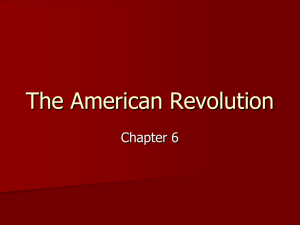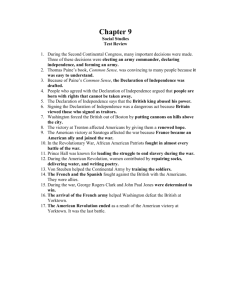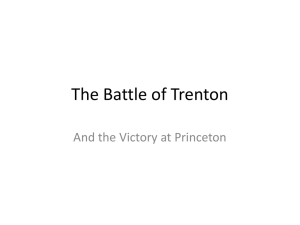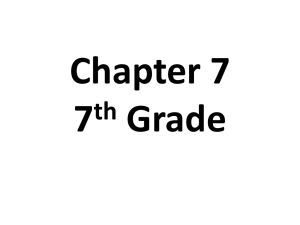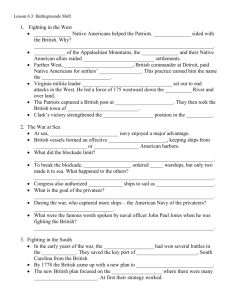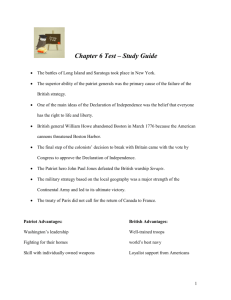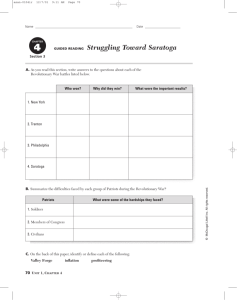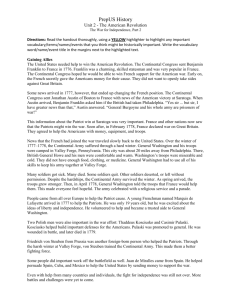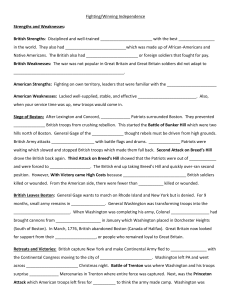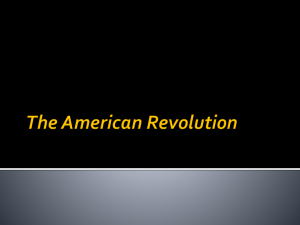The Revolutionary War
advertisement
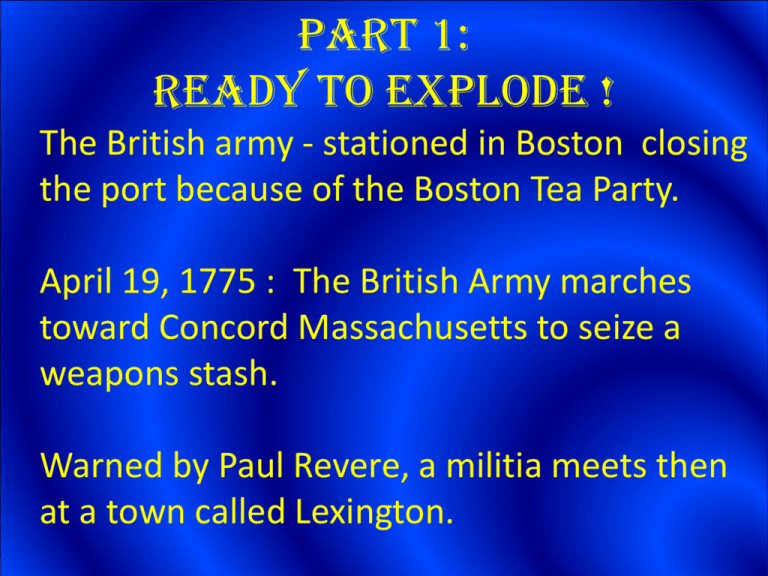
Part 1: Ready to explode ! The British army - stationed in Boston closing the port because of the Boston Tea Party. April 19, 1775 : The British Army marches toward Concord Massachusetts to seize a weapons stash. Warned by Paul Revere, a militia meets then at a town called Lexington. SECTION 1 The Revolution Begins Question: How did the fighting at Lexington and Concord affect the colonies’ dispute with Britain? SECTION 1 The “Shot Heard round the World” continued… SECTION 1 http://www.earlyamerica.com/shot_heard.htm The British defeat the Colonial militia at Lexington At Concord the Colonial militia outnumbers the British. The British are defeated and retreat back to Boston. They are shot at by the “Minutemen” along the way and suffer high casualties •Minutemen – men who were to ready to fight in a minute’s notice. SECTION 1 Continental Congress The Second •Met in Philadelphia in May of 1775. •Things were different now. Colonists had stood up to the British Army. Creates The Olive Branch Petition - a final attempt to avoid a full-blown war between the Thirteen Colonies and Great Britain. Asks the king to prevent further conflict. King George III ignores it. The Second Continental Congress also: •Created the Continental Army, •Named Washington the army’s leader Early Battles •Fort Ticonderoga – Benedict Arnold attacks the fort and captures much ammunition & weaponry for the colonists. •Bunker / Breeds Hills – Colonists dug in and fought off a larger better supplied British army until they run out of ammunition and are forced top retreat. •“Don’t shoot til’ you see the whites of their eyes!” Early Battles • The British are kept “bottled up” in Boston until Washington bombards them and forces their evacuation by sea British Washington Comparing Strengths & Weaknesses British Advantages 1. More $$ 2. More Resources 3. More Powerful Military 4. Largest Navy in World Colonial Advantages 1. Hostile Citizens 2. Homefield Advantage 3. Their supplies were close The British Plan: From Canada From Lake Ontario Split the Colonies in half. From New York Washington’s first task was to organize his rag-tag troops. •Early in the War, the Pendulum swung in favor of the British. •The British victory Quebec in Canada •General Howe drove George Washington out of New York SECTION 3 Dark Hours for the Revolution Women served as nurses, spies, or messengers; ran farms or businesses; some fought in battles Men many volunteered for army War Effort American Indians African Americans fought on both sides but many remained neutral many fought for British to gain freedom; free African Americans were allowed to join patriots The Patriots Gain New Hope Battles not usually fought in Winter •After the British victories in Quebec and New York, Gen. Howe thought the war would be over soon, so he kept his troops in NY for the winter to rest. •This gave Washington time to regroup and get some reinforcements. The Patriots Gain New Hope •The British had hired a group of Germans (Hessians) to fight for them. The Hessians had taken over New Jersey. Howe left Jersey in the Hessians hands for the winter. The Patriots Gain New Hope •Washington crosses the Delaware River and mounts a surprise attack on Christmas day. Defeats the Hessians at Trenton, NJ • The battle took less than an hour. Washington and his 2400 troops captured more than 900 Hessians w/just 5 American casualties. This boosted the American Spirit. •Washington then took off for the town of Princeton. General Cornwallis rushed to stop him. Washington won the Battle of Princeton. •After defeats at Princeton and Trenton, the British were embarrassed. They wanted revenge and they got it. •The British went on a winning streak and soon took the important city of Philadelphia Winter at Valley Forge In December 1777, Washington and his troops settled in at Valley Forge Pennsylvania for the winter. •Because of the shortages of supplies, they suffered and more than 20% of their troops died of disease & malnutrition. •By the end of the winter, Washington’s troops were growing frustrated. Friedrich von Steuben an experienced German officer came to help Washington. He ruled w/respect and fear. •With von Steuben’s help, the Continental Army was quickly becoming well trained. Turning Point at Saratoga •Battle of Saratoga stopped the winning streak and turned the tide of the war. •In this battle, the Americans captured General Burgoyne’s entire army. •The greatest victory of the war for the Americans. •Gave the world confidence that the Americans might be able beat the British. •Gave the French the opportunity to join the Americans in the war. •The entry of France & Spain into the war came at a critical time: the Americans were running very low on supplies and France & Spain provided just that.. SECTION 4 Foreign Allies •Spain and France were enemies of the British, therefore, they secretly helped the Americans during the war. •Spain helped the Americans on the western front. France helped on the Eastern front. •Many individuals also aided the French: Marquis de Lafayette – even though he lacked experience, his belief in the Patriot cause made Washington like him. He even gave up to $200,000 of his own money to the Americans. •Tadeusa Kosciuszko and Kazimierz Pulaski from Poland helped train the Americans. SECTION 5 Independence! The War in the West •George Rogers Clark – major factor in the war on the western frontier. •Made a difficult journey across rivers and forests to attack a British fort by surprise. •Kept the British busy with his small force. This didn’t allow them to destroy all hopes on the Western Front and then start closing in on Washington in the East. The War at Sea The Americans also faced difficult odds in the war at Sea. •American Navy only had 8 ships. British had hundreds. American navy tried to fight hit & run battles. •John Paul Jones: one of the most successful American Captains. Captain of ship Bonhomme Richard. •In one famous battle, the Bonhomme Richard had been struck & was sinking, when the British captain called out and asked Jones if he was ready to give up, Jones pulled up beside the British ship (Serapis) and jumped aboard. He did so yelling, “I have not yet begun to fight !” •The Bonhmme Richard sunk, but he took over the Serapis War in the South •After the American victory at Saratoga, the British focused their efforts on the Southern frontier of the War. •As they marched through the South, defeating the Patriots, they destroyed all of the patriot property. •Horatio Gates led a patriot army of about 4,000 to try and take back the South: only about 700 made it out of the battles alive. •The Patriots didn’t give up – they fought guerilla warfare. •Francis Marion – “Swamp Fox” was the best guerilla fighter for the Patriots. •Failing in the Carolinas, Cornwallis believed that Virginia would be easier to conquer and leads his army to Yorktown. • Washington along with French troops snuck up behind Cornwallis and trap him at Yorktown. •With escape for the British cut off, and being outnumbered and outgunned by the American and French Armies and the French Navy Cornwallis surrendered. Victory at Yorktown SECTION 5 Victory at Yorktown cont… Treaty of Paris 1783 •The delegates took more than 2 years to come to an agreement. •The treaty of Paris 1783 ended the war with Great Britain recognizing the independence of the US. •The treaty also set new borders for the US. •With the war over, the Patriots could now return New Borders of The US.
